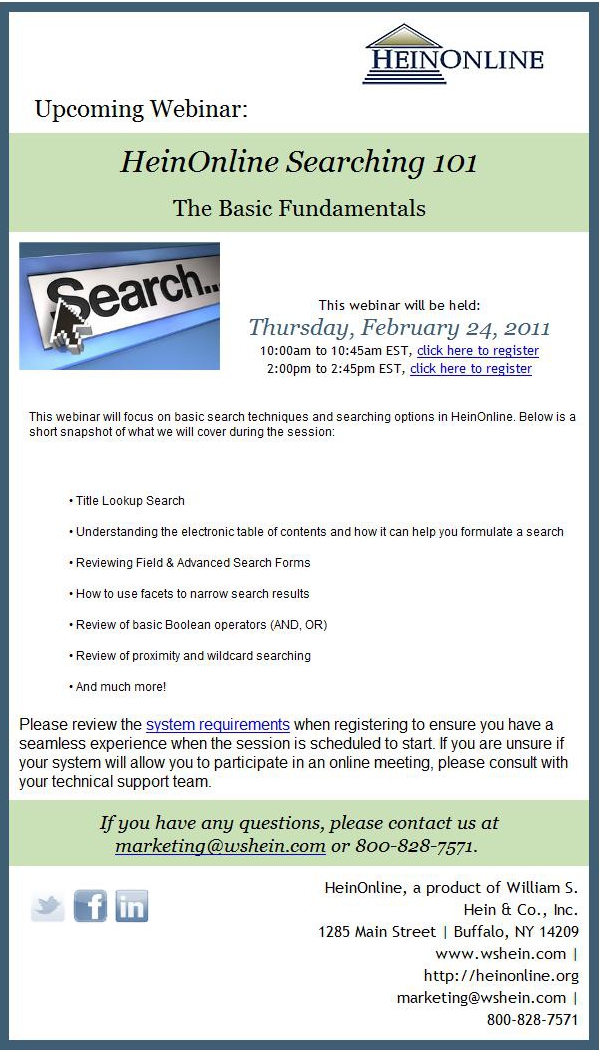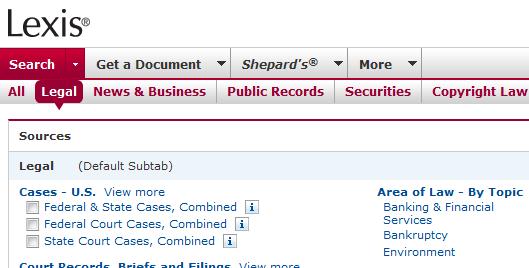 When members of the legal community think about legal scholarship, what typically comes to mind is the concept of a print law journal (e.g., the Cornell Law Review, the Cornell Journal of Law & Public Policy, the Cornell International Law Journal, etc.). These works undoubtedly serve a very important function, but I wanted to write a bit about another relevant legal journal sited at Cornell Law School: the LII Supreme Court Bulletin. I am fairly familiar with this Web site, having served as an LII editor during the 2009-10 academic year (my now-outdated biography is viewable here). The LII Supreme Court Bulletin (“Liibulletin”) contains previews of cases on the Supreme Court’s (“SCOTUS”) docket. Because the previews are written with recourse to the relevant parties’ submitted briefs (the full versions of which are usually available here) and are published before the decisions are handed down, the previews generally reflect a balanced view of the legal issues unaffected by the bias of hindsight.
When members of the legal community think about legal scholarship, what typically comes to mind is the concept of a print law journal (e.g., the Cornell Law Review, the Cornell Journal of Law & Public Policy, the Cornell International Law Journal, etc.). These works undoubtedly serve a very important function, but I wanted to write a bit about another relevant legal journal sited at Cornell Law School: the LII Supreme Court Bulletin. I am fairly familiar with this Web site, having served as an LII editor during the 2009-10 academic year (my now-outdated biography is viewable here). The LII Supreme Court Bulletin (“Liibulletin”) contains previews of cases on the Supreme Court’s (“SCOTUS”) docket. Because the previews are written with recourse to the relevant parties’ submitted briefs (the full versions of which are usually available here) and are published before the decisions are handed down, the previews generally reflect a balanced view of the legal issues unaffected by the bias of hindsight.
Liibulletin is a fantastic resource for people who are interested in keeping abreast of SCOTUS cases, but don’t have tons of free time to do so (e.g., law students who have more than enough assigned reading for courses). But one of the really neat things about LII bulletin is that it is particularly comprehensible and may be utilized by people without legal educations or backgrounds. In order to ensure that LII previews remain accessible to lay persons, all the previews contain hyperlinks to a free legal dictionary and encyclopedia called Wex. You will also note, by the way, that this dictionary, although frequently embedded within Liibulletin, is its own free-standing resource.
Each preview contains the following sections:
(1) A few key subject areas and descriptive terms. These lists of terms are useful since anyone can perform a subject-matter search in Liibulletin across SCOTUS terms.
(2) An executive summary. This section, which is emailed to all Liibulletin subscribers, succinctly identifies the relevant facts, issues, and arguments of the case. It also generally addresses the legal (and, if relevant, nonlegal) significance(s) of the case.
(3) Itemized questions presented. These are copied verbatim as provided on the Supreme Court’s case schedule.
(4) Itemized issues. As I mentioned earlier, Liibulletin is published with the underlying goal of making the law accessible to the public. In this way, this section can be thought of as a simplification of the questions presented section.
(5) Factual narrative. Predictably, this section tells a balanced story of the case and discusses facts pertinent to the controversy before the Court.
(6) Discussion. This is the section that focuses on the greater picture. It calls into question the consequences of the case from largely a policy perspective. This section more or less explains the importance of the case.
(7) Analysis. The analysis section is a detailed and balanced analysis and explanation of the legal issues before the Court. It typically goes beyond summarizing the parties’ briefs and actually synthesizes the lower courts’ opinions and the briefs submitted by amici curiae.
(8) Conclusion. The conclusion essentially restates the executive summary by tying everything together. Once in a while, LII editors will include their own opinions about how the Court should rule.
(9) Additional Sources. Each preview concludes with a list of additional legal sources that discuss the case.
I absolutely encourage anyone (or better yet, everyone) with an interest in learning about the Supreme Court’s docket to peruse the previews. If you’d like to have the previews sent directly to your email address, you can subscribe to Liibulletin here.
Daniel Shatz, Cornell Law School 3L Student
Photo courtesy of dbking’s Flickr stream.









